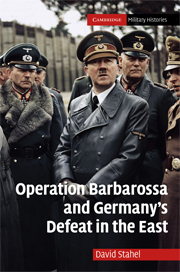Book contents
- Frontmatter
- Contents
- List of Illustrations
- List of Maps
- Acknowledgements
- Glossary of terms
- Tables of military ranks and army structures
- Introduction
- Part I Strategic plans and theoretical conceptions for war against the Soviet Union
- Part II The military campaign and the July/August crisis of 1941
- Conclusion
- Bibliography
- Index
- References
- Frontmatter
- Contents
- List of Illustrations
- List of Maps
- Acknowledgements
- Glossary of terms
- Tables of military ranks and army structures
- Introduction
- Part I Strategic plans and theoretical conceptions for war against the Soviet Union
- Part II The military campaign and the July/August crisis of 1941
- Conclusion
- Bibliography
- Index
- References
Summary
Having focused in this study primarily on the problems of the German summer offensive, there might be those who would wish to point out that things were much worse on the Soviet side of the line. That the summer of 1941 represented a Soviet debacle of grand proportions, typified by mass confusion and an enormous wastage of men and material, is not in question here. The fact remains, however, that these losses, while dreadfully costly to the Soviet war effort, were bearable. Indeed, far from crumbling, the Red Army was in fact growing in size, fed by the huge pool of non-active reserves. Moreover, unlike the German army, the Red Army did not have to win the war in 1941, it only had to survive long enough for Germany's offensive strength to exhaust itself. The winter granted the Soviet Union a reprieve, which was sweetened by the entry of the United States into the war. Thus, whatever may be said of the Red Army's weaknesses in the summer of 1941, it was entirely successful in one fundamental respect – it confounded the German leadership's plan to conquer the Soviet Union in a Blitz-style campaign in the early weeks of the war. As Jacob Kipp concluded in his study on the battle of Smolensk:
At a horrible cost in losses, Russia gave up her sons and her land to bleed the Wehrmacht white, even if the losses were 10 to 1 in favour of the German invader. Nazi ideology and occupation policies in the end made such sacrifices seem justified and legitimized Soviet totalitarianism…After Smolensk it was clear that this would be a long war, not a Blitzkrieg. The Soviet state and society, which Lenin and Stalin had cast as a vast mechanism for mobilization and militarization, had begun that process in earnest.
- Type
- Chapter
- Information
- Operation Barbarossa and Germany's Defeat in the East , pp. 439 - 451Publisher: Cambridge University PressPrint publication year: 2009



